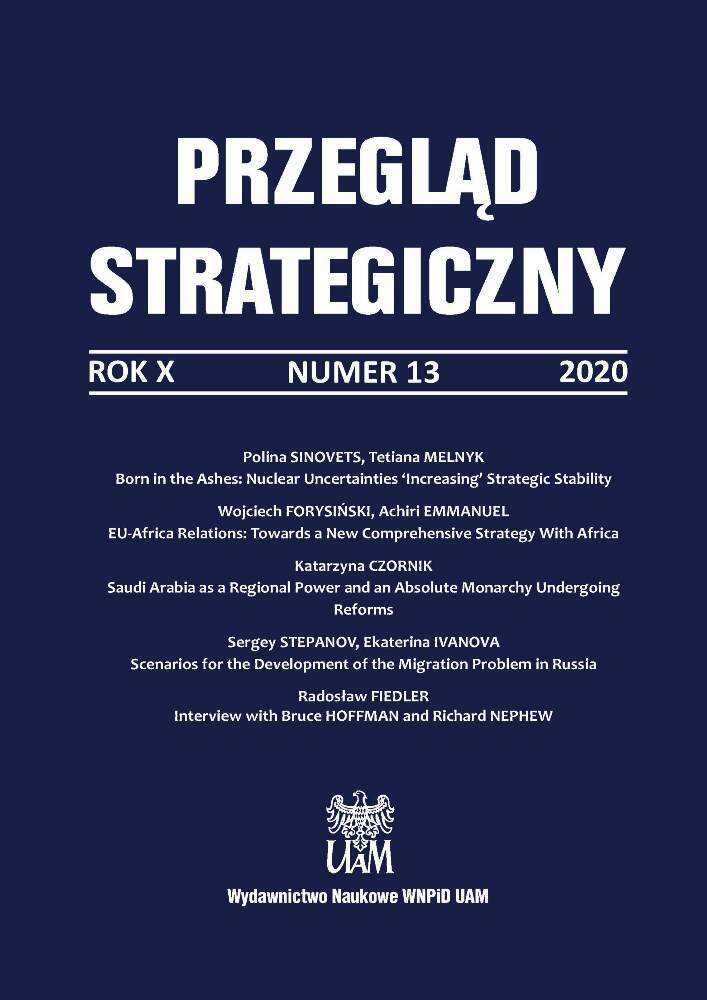Abstrakt
Turcja i Stany Zjednoczone są partnerami strategicznymi od ponad siedemdziesięciu lat. Wzajemne stosunki nie zawsze przebiegały jednak bezkonfliktowo i sporadycznie dochodziło do przejściowych kryzysów dwustronnych. Mimo wyzwań, obaj sojusznicy z NATO – Stany Zjednoczone i Turcja – od lat potwierdzają swoje zaangażowanie we współpracę jako „partnerzy strategiczni”. Jednak wskutek narastającego kryzysu syryjskiego stosunki między sojusznikami osiągnęły bezprecedensowo niski poziom. Niniejsze studium analizuje stosunki między Turcją a Stanami Zjednoczonymi w kontekście trwającego w Syrii konfliktu z zastosowaniem metody analizy konfliktu. W jej ramach analizujemy tło historyczne, określamy pierwotne przyczyny kryzysu i przeprowadzamy analizę aktorów. Na podstawie swoich ustaleń przedstawiamy zalecenia dotyczące polityki mającej na celu de-eskalację i przekształcenie obecnego kryzysu w stosunkach USA-Turcja w sposób pozwalający przywrócić wzajemne zaufanie, ale także znaleźć nowe sposoby współpracy w charakterze strategicznych partnerów
Bibliografia
Abramowitz M., Edelman E. S. (2013), U.S.-Turkey Cooperation Toward a Post-Assad Syria, National Security Program Foreign Policy Project.
Ahmad P. T. (2015), US-Turkey Relations and Syria Crisis, “Alternatives”, Vol 4, No. 4, http://alternatives.yalova.edu.tr/article/view/5000173351/5000164712 (21.08.2017).
Akyeşilmen N. (2014), Çatışa Yönetimi: Kavramsal ve Kuramsal Bir Analiz, in: Brışı Konuşmak: Teori ve Pratikte Çatışma Yönetimi (2. baskı), (ed.) Nezir Akyeşilmen, ODTÜ yayınevi, Ankara.
Akyeşilmen N., Tinker V. (2016), Conflict Analysis: Rights-Based Peace Model, in: The Possibilities of Peace in Syria: An Alternative Approach to Conflict Analysis, (eds.) Nezir Akyeşilmen, Önder a Afşar, Orion Yayınevi, Ankara.
Albright M. K., Hadley S. J. (2012), U.S.-Turkey Relations: A New Partnership, “Independent Task Force Report No. 69”, Council On Foreign Relations, https://www.cfr.org/sites/default/files/pdf/2012/05/TFR69_Turkey.pdf (25.08.2017).
Aljazeera (2016), Turkey’s jarablus operation Scorecard, http://www.aljazeera.com/indepth/opinion/2016/09/turkey-jarablus-operation-scorecard-160901095251276.html (31.08.2017).
Aljazeera (2019a), Turkey: S-400 purchase ‘not a preference but a necessity, “New/Russia”, (13.07.2019).
Aljazeera (2019b), Turkey-US centre on Syria safe zone ‘fully operational, https://www.aljazeera.com/news/2019/08/turkey-centre-syria-safe-zone-fully-operational-190824182223857.html (25.08.2019).
Altunışık M. B. (2016), The Inflexibility of Turkey’s Policy in Syria, “Mediterrranean Yearbook”, http://www.iemed.org/observatori/arees-danalisi/arxius-adjunts/anuari/med.2016/IEMed_MedYearbook_2016_keys_Turkey_Syrias_Policy_Benli_Altunisik.pdf (29.08.2017).
Aydıntaşbaş A., Kirişçi K. (2017), The United States and Turkey: Friends, Enemies or only Interests, Washington, The Centre on The United States and Europe at Brookings, Turkey project Policy Paper Number 12, https://www.brookings.edu/wp-content/uploads/2017/04/aydintasbas-kirisci_united-states-and-turkey.pdf (28.08.2017).
Ayhan V. (2011), Arap Baharının ABD-Türkiye İlişkilerine Etkisi, “Ortadoğu Analiz”, Vol. 3, No. 36, http://www.orsam.org.tr/files/OA/36/2veysel.pdf (29.08.2017).
Bağcı H. (2014), Önsöz Yerine: Çatışma Analizi, in: Brışı Konuşmak: Teori ve Pratikte Çatışma Yönetimi (2. baskı), (ed.) Nezir Akyeşilmen, ODTÜ yayınevi, Ankara.
Barkey H. J. (2016), Syria’s Dark Shadow Over US-Turkey Relations, “Turkish Policy Quarterly”, Vol. 14, No. 4, http://www.aljazeera.com/indepth/opinion/2016/09/turkey-jarablus-operation-scorecard-160901095251276.html.
Bennett N. (2015), Turkey and the United States: Friends or Foes?, “Journal of the Oxford Centre for the Study of Law & Public Policy” 1(2).
Çağlar B. (2012), Türkiye’nin Suriye Politikası: Yeni Klasik-Realist Bir Bakış, “Ortadoğu Analiz”, Vol. 4, No. 47, http://www.orsam.org.tr/files/OA/47/4bariscaglar.pdf (21.08.2017).
Demir S. (2012), Irak ve Suriye Krizlerinin Karşılaştırmalı Analizi: Nedenler, gelişmeler, Sonuçlar ve türkiye Üzerine Etkileri, “Türk Dünyası İncelemeleri Dergisi: Journal of Turkish World Studies”, XII (2).
Dinçer O. B., Kutay M. (2013), The Arab Spring: A Game Changer in Turkey-EU Relations?, “Perspectives on European Politics and Society”, Vol. 14, No. 4.
Doster B. (2013), İttifaklar, Türk Dış Politikası ve Suriye, “Ortadoğu Analiz”, Vol. 5, No. 58, http://www.orsam.org.tr/files/OA/58/7barisdoster.pdf (21.08.2017).
Hacaoglu S. (2019), Turkey Sees U.S. Deal as Start of Wider Purge of Kurdish Militia, https://www.bloomberg.com/news/articles/2019-08-24/turkey-sees-u-s-deal-as-start-of-wider-purge-of-kurdish-militia (12.09.2019).
Kırdar S. (2012), Türkiye-ABD İlişkilerinde politika Farklılıkları Derinleşirken, Ankara, TEPAV Değerlendirme Notu, http://www.tepav.org.tr/upload/files/13561763991.Turkiye_ABD_Iliskilerinde_Politika_Farkliliklari_Derinlesirken.pdf (28.08.2017).
Lister T. (2019), Turkey bought Russian S-400 missiles designed to down NATO planes. For the US, that’s a Problem, CNN, https://edition.cnn.com/2019/07/13/europe/turkey-russia-missiles-nato-analysis-intl/index.html (21.08.2019).
Liu K., Taylor C. (2011), United States-Turkey-Iran: Strategic Options for the Coming Decade, Institute of Politics, http://iop.harvard.edu/sites/default/files_new/Programs/US_TurkeyIranPolicyPaper.pdf (31.08.2017).
HIIK (2003), Conflict Barometer 2003, Heidelberg Institute on International Conflict Research. https://hiik.de/download/conflict-barometer-2003/ (21.05.2020).
Pirinççi F. (2014), ABD’nin IŞİD Stratejisi ve Irak ile Suriye’ye Olası yansımaları, ORSAM Raport No. 191, Ankara.
Muasher M., Bubnova N. (2012), The Fall of Bashar-al Assad’s Regime Is Inevitable, Carnegie Endowment for International Peace, https://carnegieendowment.org/2012/02/29/fall-of-bashar-al-assad-s-regime-is-inevitable-pub-47334 (25.08.2017).
Safeworld, Conflict Analysis, https://www.saferworld.org.uk/downloads/chapter2_266.pdf (10.12.2016).
Schanzer J., Tahiroglu M. (2016), Ankara’s Failure: How Turkey Lost The Arab Spring, Foreign Affairs, https://www.foreignaffairs.com/articles/turkey/2016-01-25/ankaras-failure (21.05.2020).
Stein A. (2019), The Crisis Is Comıng: Syria and the end of the U.S.-Turkish Alliance, War on The Rocks, https://warontherocks.com/2019/08/the-crisis-is-coming-syria-and-the-end-of-the-u-s-turkish-alliance/ (13.08.2020).
Tanır İ. (2011), How does the Arab Spring Transformed Turkish-American Relations, “Turkish Policy Quarterly”, Vol. 10, No. 3, http://turkishpolicy.com/Files/ArticlePDF/how-the-arab-spring-is-transforming-turkish-american-relations-fall-2011-en.pdf (25.08.2017).
Tanış T. (2016), US-Turkey Relations at a Breaking Point over the Kurds, “Turkish Policy Quarterly”, 14 (4), http://turkishpolicy.com/article/791/us-turkey-relations-at-a-breaking-point-over-the-kurds (09.08.2017).
TEPAV, Türkiye-Avrupa Birliği-ABD: İlişkiler Nereye?, TOBB Ekonomi ve Teknoloji Üniversitesi [n.a.], http://www.tepav.org.tr/upload/files/haber/1281443139-0.Iliskiler_Nereye_Gidiyor.pdf (31.08.2017).
Türkmen F. (2016), Obama Dış Politikasının Genel Değerlendirmesi ve Türkiye, “Bilgesam”, http://www.bilgesam.org/Images/Dokumanlar/0-459-2016042559obama_sunum.pdf (24.08.2017).
Uslu N. (2000), 1947’den Günümüze Türk-Amerikan İlişkilerniin Genel Pırtresi, “Avrasya Dosyası”, Vol. 6, No. 2, http://21yyte.org/assets/uploads/files/203-232%20nasuh%20uslu.PDF (31.08.2017).
Yegin M., Selim H. (2016), U.S.-Turkey Relations: How to Proceed after Obama, “GMF On Turkey Series”, https://ssrn.com/abstract=2873634 (31.08.2017).
Zanotti J. (2013), Turkey: Background and U.S. Relations in Brief, Washington, CRS Report Prepared for members and committee of Congress, April 2013, https://digital.library.unt.edu/ark:/67531/metadc627098/m1/1/high_res_d/R44000_2015Apr23.pdf (29.08.2017).

